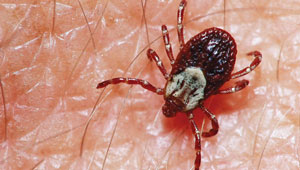
American dog tick (Dermacentor variabilis) Photo: ©Gene White
University of Massachusetts researchers believe that they have identified a new way of warding off ticks, creating a chemical “force field,” which works in ways insect repellents have proved ineffective.
Using a device funded by the U.S. Army that can be attached to soldiers’ boots, the research team said it could be on the way to limiting tick bites, which can transmit dangerous diseases, according to Mass Live.
As the climate warms, ticks are increasingly spreading into newer territory further north. But the traditional defenses against creatures of their ilk — such as bug sprays — do little to sway a tick from crawling up one’s leg and latching on for a meal.
Using two different types of repellents, the UMass researchers said they made ticks less likely to climb vertically — as they would up a soldier or a hiker’s leg in tall grass, for example — and more likely to detach from whatever surface they might be scaling.
“Repellents probably won’t stop ticks from getting on us,” Dr. Stephen Rich, the UMass microbiology professor leading the research, told Mass Live. “We hope the repellents will help keep them from staying on us, and that’s where the battle lines really should be drawn.”
Most insect repellants were developed more than 75 years ago with mosquitos in mind, Dr. Rich said. DEET, the principal active chemical in most bug spray, was made to keep quick-moving mosquitos from landing on humans. But ticks don’t hover, land, feast and fly away in a matter of seconds. They wait for a human or animal to pass by, latch on and climb slowly up their host until they can bite and eat.
To test an experimental repellent, researchers in Dr. Rich’s Laboratory of Medical Zoology in Amherst, Mass., placed ticks in a small, transparent chamber. The chamber is also home to three vertical climbing sticks — stand-ins for the human limbs they might scale in the real world. They examined how ticks reacted to the controlled release of certain chemicals, and whether the substances deterred them from climbing.
To release the chemicals, the researchers used a small device developed with the U.S. Department of Defense funding to be placed on soldiers’ boots.
The research team found that two specific pyrethroids — transfluthrin and metofluthrin — generated a “force field” that slowed or dissuaded the ticks’ upward progress. The experiment focused on the three species of tick most responsible for biting humans in the U.S.: the black-legged, or deer tick (Ixodes scapularis), the American dog tick (Dermacentor variabilis) and the lone star tick (Amblyomma americanum). The trio are among several tick species that are responsible for the spread of Lyme disease, Rocky Mountain spotted fever and ehrlichiosis.
The results were published in the journal PLOS ONE, the university announced in a news release.
In a statement from the university, Dr. Rich said the findings showed that “spatial repellents” could change tick behaviors in a way that could lead to fewer tick bites. His paper described the ticks as entering a “drunken-like” state after being exposed to the chemicals.
In this specific study, transfluthrin deterred 75 percent of dog ticks, 67 percent of lone star ticks and 50 percent of deer ticks. The other pyrethroid, metofluthrin, was even more effective, warding off 81% of dog ticks, 73% of lone star ticks and 72% of deer ticks.
“We were impressed with not just the repellency, but the behavioral changes in the tick,” said Dr. Noel Elman, founder of Cambridge, Mass.-based GearJump Technologies, which designed the device that releases the chemicals in a controlled manner.
The researchers intend to continue probing, eventually testing how the chemicals defend humans themselves. Eventually, a device like the Army-funded unit tested at UMass could become commercially available, the researchers said.
<p>The post Study: New way of warding off ticks first appeared on Pest Management Professional.</p>
from Pest Management Professional https://www.mypmp.net/2024/07/25/study-new-way-of-warding-off-ticks/
Sacramento CA
No comments:
Post a Comment